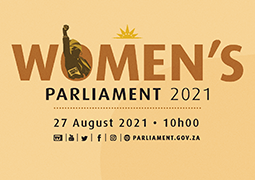
The women of South Africa convened at Parliament and virtually today to observe women’s month and celebrate the year of Charlotte Mannya Maxeke: advancing gender equality, through inclusive economic growth and the precepts of a capable developmental state.
In her opening address, the Speaker of the National Assembly (NA), Ms Nosiviwe Mapisa-Nqakula, pointed out that today’s event took place just after the launch of the Review of the Women’s Charter, which seeks to advance the mainstreaming of gender equity in all spheres of our society.
A frank interrogation of tangible progress since the inception of the charter in 1994 is necessary, the Speaker believes, as it is a living document whose progress should be constantly monitored. “Women’s Parliament shouldn’t become a ritual talk shop. But should assess if there was any follow-up on issues discussed previously.
“Embraced in this vein, it would be a progressive platform to receive feedbacks on the implementation of previous commitments by the three tiers of government, to also identify failures, skewed progress and whether was there any implementation of tangible targets.” She cautioned that the success of the provisions of the Women’s Charter would depend on the collective effort of all political parties in Parliament and should not be sacrificed at the altar of party-political partisanship and bickering.
Growing rates of gender-based violence (GBV) are a concern, she went on, but the plight of men should also be given the attention if we were to find lasting solutions. The Speaker also noted the devastation wrought by the Covid-19 pandemic on women’s economic situation. “During lockdown we have seen the reversal of women empowerment. And it poses a dangerous scenario in relation to the gender targets and objectives of the National Development Plan.”
Also speaking at the conference, the Minister in the Presidency for Women, Youth and People with Disabilities, Ms Maite Nkoana-Mashabane, said: “We are supposed to be celebrating the women’s month and commemorating the August resolve of our forebears in championing the women’s cause, but we have instead witnessed a rise in GBVF [gender-based violence and femicide], which serves as a tragic reminder of a pandemic that continue to rob women their basic human rights.”
She then gave an extensive report of her department’s initiatives in upholding the government’s commit to the national strategic plan (NSP) on GBVF. She reported that, as of 9 August 2021, her department has released a year-one report on its response to the commitments outlined in the plan and that departments have been helped in integrating the plan into their annual targets.
Covid is a global crisis, but nonetheless it has brought its own set of opportunities, Ms Nkoana-Mashabane said. One example is that during the pandemic, government has seen an acceleration of the institutionalisation of the NSP’s GBVF instruments in many departments, who have allocated well over R20 billion in the past financial year towards the implementing them. Moreover, the establishment of Inter-Ministerial Committee on GBVF has facilitated an intergovernmental collaboration, which was not the case in the past.
Her department has also forged ties with the Department of Planning, Monitoring and Evaluation to support it in refining its NSP targets, indicators and interventions. She further reported that her department has managed to operationalise and localise the NSP targets in municipalities and provincial governments to ensure that they are part of their Integrated Development Plans and they play a responsible role in realising them.
As a measure to strengthen the NSP, the Department of Justice and Correctional Services has audited GBVF services in 30 hot spots across the country, Ms Nkoana-Mashabane reported. She commended parliamentary committees for using the Parliamentary Oversight Framework to promote accountability on the NSP. The proposed National Council of GBVF will also play an oversight role over the government’s implementation of NSP targets.
It is significant, she pointed out, that the costing of NSP has been finalised, which will improve its capacity and effectiveness. According to her department’s projections, “it’s hoped that by 2030 we would have, as a country, dealt with the root causes of GBVF once and for all”. For this to happen, however, women’s economic empowerment will have to be accelerated. She is optimistic that the 40% set aside in government’s procurement policy for women and women-owned businesses “would bring women economic justice, will assist them to reach their full economic potential and will go a long way in eradicating this pandemic”.
“Our lasting victory against GBVF,” she concluded, “lies in turning our commitments into actions.”
Abel Mputing
27 August 2021

